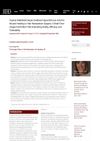 2 citations,
September 2023 in “Curēus”
2 citations,
September 2023 in “Curēus” Topical spironolactone may help treat ocular graft-versus-host disease with minimal side effects.
 2 citations,
July 2023 in “Journal of Cosmetic Dermatology”
2 citations,
July 2023 in “Journal of Cosmetic Dermatology” The topical treatment reduced hair loss and improved hair growth in patients with certain types of hair loss.
2 citations,
March 2022 in “Journal of Cosmetic Dermatology” Topical finasteride is a safe and effective treatment for pattern hair loss with fewer side effects than oral finasteride.
2 citations,
February 2021 in “Case reports in dermatological medicine” The new topical botanical formulation significantly regrew hair in all five patients without side effects.
 2 citations,
January 2021 in “JAAD Case Reports”
2 citations,
January 2021 in “JAAD Case Reports” Using a special laser and skin medication together successfully cleared a skin condition in a pregnant woman.
 2 citations,
February 2016 in “British Journal of Dermatology”
2 citations,
February 2016 in “British Journal of Dermatology” Bimatoprost solution 0.03% is effective for treating sparse eyelashes.
2 citations,
January 2009 A natural extract-based hair growth product was developed and showed promise in preliminary tests.
2 citations,
December 1973 in “Calcified tissue research” Epilation and DHT cause skin calcification by increasing ATP and calcium deposits.
 1 citations,
April 2024 in “Skin research and technology”
1 citations,
April 2024 in “Skin research and technology” Topical rosuvastatin and melatonin creams significantly reduce psoriasis severity and are safe.
1 citations,
January 2024 in “Pharmaceuticals” A new carrier improves skin delivery of tofacitinib for treating inflammatory skin diseases.
 1 citations,
November 2023 in “International Journal of Dermatology”
1 citations,
November 2023 in “International Journal of Dermatology” Topical calcineurin inhibitors might be safer than steroids for scarring alopecia, but more research is needed.
 1 citations,
October 2022 in “PubMed”
1 citations,
October 2022 in “PubMed” Patients generally have positive attitudes towards using topical Minoxidil for hair loss treatment.
1 citations,
August 2022 in “Journal of Cosmetic Dermatology” Using both 5% spironolactone and 5% minoxidil together is safe and more effective for treating hair loss.
1 citations,
January 2017 in “Hair therapy & transplantation” Topical zinc-thymulin is safe and effective for treating male pattern baldness.
 1 citations,
August 2005 in “British Journal of Dermatology”
1 citations,
August 2005 in “British Journal of Dermatology” Accidentally eating a topical steroid may rarely cause acute generalized pustular psoriasis.

Intradermotherapy with minoxidil is as effective as topical application for treating hair loss.
Combining oral vitamin D with topical minoxidil is most effective for improving female pattern hair loss.
 January 2025 in “Lasers in Medical Science”
January 2025 in “Lasers in Medical Science” Combining fractional CO2 laser with topical dutasteride is more effective for treating male hair loss than using the laser alone.
 December 2024 in “Egyptian Poultry Science”
December 2024 in “Egyptian Poultry Science” Ivermectin 0.1% is the best and safest topical treatment for rabbit mange.
 December 2024 in “Therapeutic Delivery”
December 2024 in “Therapeutic Delivery” Topical dutasteride shows promise for hair loss but needs more research.
December 2024 in “Chinese Chemical Letters” A new topical finasteride gel using nanoparticles shows promise for safe and effective hair regrowth.
 July 2024 in “The journal of investigative dermatology/Journal of investigative dermatology”
July 2024 in “The journal of investigative dermatology/Journal of investigative dermatology” Using both topical and oral minoxidil does not reduce hair shedding.
 June 2024 in “Indian Dermatology Online Journal”
June 2024 in “Indian Dermatology Online Journal” Topical tofacitinib is effective and safe for treating alopecia areata.
 April 2024 in “Skin health and disease”
April 2024 in “Skin health and disease” Using a special skin cream with gabapentin helped reduce symptoms of a certain scalp condition but didn't change nerve fibers or skin chemicals.

Topical therapy principles guide how to properly apply treatments directly to the skin.
 January 2024 in “Al-Azhar International Medical Journal /Al-Azhar International Medical Journal”
January 2024 in “Al-Azhar International Medical Journal /Al-Azhar International Medical Journal” Betamethasone valerate lotion is more effective for treating multiple patchy alopecia areata.
 December 2023 in “International journal of multidisciplinary research and analysis”
December 2023 in “International journal of multidisciplinary research and analysis” SH-MSCs gel reduced IL-6 and increased TGF-β, suggesting it could treat alopecia.
 November 2023 in “Journal of Drugs in Dermatology”
November 2023 in “Journal of Drugs in Dermatology” Hypochlorous acid spray improves wound healing and reduces redness and itching in hair transplant surgery.
 October 2023 in “Faculty Opinions – Post-Publication Peer Review of the Biomedical Literature”
October 2023 in “Faculty Opinions – Post-Publication Peer Review of the Biomedical Literature” Using both minoxidil and finasteride together on the scalp works better for male hair loss than using either one alone.
 September 2023 in “Journal of Cosmetic Dermatology”
September 2023 in “Journal of Cosmetic Dermatology” Topical cetirizine may help increase hair length in male pattern baldness and could be an alternative to minoxidil with fewer side effects.





















